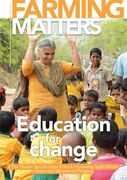Is there a future for today’s youth in tomorrow’s agriculture? Not if we will live in a world where agriculture is in the hands of a couple of large companies and a small segment of farming entrepreneurs who have made it in the rat race. And, not if policymakers continue thinking in linear growth models dominated by the logic that “farmers can either move up the ladder of globalised and industrialised agriculture, or be out”. Another world is possible, and education plays a crucial role in making it a reality.
Suppose we see the world as a place where hundreds of millions of farm families, now and in the foreseeable future, produce varied and healthy foods for a growing population, cater to local and regional markets, work with the ecosystems around them and safeguard beautiful landscapes and cultural values. A world where urban dwellers know where their food comes from and where rural children have a chance to learn about basic agro-ecological processes on their own farms.
That world is possible but we must invest in it now. Education is a key driver of change, of transformation towards a greener and more connected global society. Educational institutions (formal and nonformal) can become places where people learn –in very practical ways– about improving resilience to climate change, about the importance of biodiversity, about the nutritional value of local foods and herbs, and the economics of sustainable agriculture and consumer relations. They can serve as places for validating endogenous agricultural knowledge, observing ecosystems and the behaviour of insects, and studying the characteristics of different seeds. Schools need to be places where students, teachers and farmers re-connect with Agri-Culture making it an attractive proposition for the future, while exploring new approaches and solutions.
As citizens of global society, we need to make choices today; on the future of our food, our landscapes, our culture and the education of our children. The articles in this issue of Farming Matters show that in different parts of the world, and in a wide range of educational settings, there are inspired and visionary educators at work, giving education a new meaning as a driver in rural transformation towards just and sustainable societies. Let us join forces, get inspired and inspire. This is no rocket science, we can all be part of the change we want to see.
Edith van Walsum
director ILEIA

